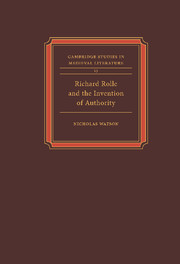Book contents
- Frontmatter
- Contents
- Preface
- List of abbreviations
- Introduction: Contexts: three preliminary essays
- PART I
- 1 Interpreting Rolle's life
- 2 The structure of Rolle's thought
- PART II
- PART III
- PART IV
- Epilogue: Rolle as a late medieval Auctor
- Excursus I: The chronology of Rolle's writings
- Excursus II: Rolle's reading and the reliability of the Officium
- Notes
- Bibliography
- Index
1 - Interpreting Rolle's life
Published online by Cambridge University Press: 04 December 2009
- Frontmatter
- Contents
- Preface
- List of abbreviations
- Introduction: Contexts: three preliminary essays
- PART I
- 1 Interpreting Rolle's life
- 2 The structure of Rolle's thought
- PART II
- PART III
- PART IV
- Epilogue: Rolle as a late medieval Auctor
- Excursus I: The chronology of Rolle's writings
- Excursus II: Rolle's reading and the reliability of the Officium
- Notes
- Bibliography
- Index
Summary
The surviving works of the fourteenth-century English hermit and mystic Richard Rolle are voluminous. His two complete psalm commentaries, with his commentaries on the Lord's Prayer, the Creeds, Lamentations, and Revelation (English Psalter, Latin Psalter, Super Orationem Dominicam, Super Symbolum Apostolorum, Super Symbolum S. Athanasii, Super Threnos, Super Apocalypsim – the last is incomplete) would themselves take up a good thousand columns of a hypothetical continuation of the Patrologia Latina. Yet even in terms of length, these works account for no more than half his output. He also wrote five more discursive biblical expositions, Super Canticum Canticorum (on the first verses of the Song of Songs), Super Lectiones Mortuorum (on parts of Job), Super Psalmum Vicesimum, Super Mulierem Fortem (on a text in Proverbs) and Super Magnificat; three works we can loosely call treatises, Incendium Amoris, Contra Amatores Mundi and Melos Amoris; several epistles or works of instruction in Latin (Judica Me, Emendatio Vitae) and English (Ego Dormio, The Commandment, The Form of Living); a Latin poem to the Virgin (Canticum Amoris), probably two English Passion meditations, and a handful of short English prose pieces and lyrics. Of this second group of substantially original works, the English works have become famous as early masterpieces of prose or poetry, while the Latin works deserve an equal reputation not only for their oddity but for their rhetorical skill and sometimes beauty. Rolle was among the most stylish, as well as the most prolific, writers of late-medieval England.
The authorship of these works is well attested by Rolle's distinctiveness of style and thought and by numerous manuscript ascriptions, and generally the manuscripts of the works do not present major textual difficulties.
- Type
- Chapter
- Information
- Richard Rolle and the Invention of Authority , pp. 31 - 53Publisher: Cambridge University PressPrint publication year: 1991



